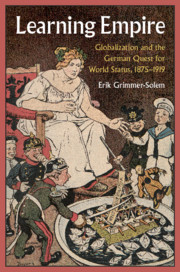Book contents
- Learning Empire
- Learning Empire
- Copyright page
- Contents
- Illustrations
- Acknowledgments
- Abbreviations
- Introduction
- Part I Absent-Minded Empire, 1875–1897
- Part II Empire Imagined, 1897–1907
- 4 World Policy
- 5 The High Seas Fleet and Power Politics
- 6 National Efficiency and the New Mercantilism
- 7 Formal and Informal Empire
- 8 Empire in Crisis
- Part III Empire Lost, 1908–1919
- Epilogue
- Selected Bibliography
- Index
6 - National Efficiency and the New Mercantilism
from Part II - Empire Imagined, 1897–1907
Published online by Cambridge University Press: 20 September 2019
- Learning Empire
- Learning Empire
- Copyright page
- Contents
- Illustrations
- Acknowledgments
- Abbreviations
- Introduction
- Part I Absent-Minded Empire, 1875–1897
- Part II Empire Imagined, 1897–1907
- 4 World Policy
- 5 The High Seas Fleet and Power Politics
- 6 National Efficiency and the New Mercantilism
- 7 Formal and Informal Empire
- 8 Empire in Crisis
- Part III Empire Lost, 1908–1919
- Epilogue
- Selected Bibliography
- Index
Summary
With Bülow becoming chancellor in 1900, Schmoller and his students became advisors to the government in many capacities. The southward shift of German interest into the Yangtze valley advocated by Hermann Schumacher took concrete form during the suppression of the Boxer Rebellion, itself an outgrowth of Germany’s seizure of Kiaochow in 1897 and German railway construction in Shantung. The Boxer intervention led to strained relations with Britain and encouraged an Anglo-Japanese alliance around a common fear of Russia. These developments were also tied up with British anxieties about decline during and after the Boer War in which Germany began to play the role both as model and menace. The writings and activities of Schmoller and his students played an important role in these perceptions. The Bülow tariff of December 1902 likewise contributed to growing trade frictions with Britain that encouraged Joseph Chamberlain’s campaign for tariff reform and imperial federation and the coalescence of a German menace in the minds of many other British observers, misperceptions fed to an unusual degree by German naval propaganda and the rancorous debates over German tariffs.
Keywords
- Type
- Chapter
- Information
- Learning EmpireGlobalization and the German Quest for World Status, 1875–1919, pp. 250 - 289Publisher: Cambridge University PressPrint publication year: 2019



